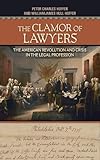The Clamor of Lawyers : The American Revolution and Crisis in the Legal Profession / Peter Charles Hoffer, Williamjames Hull Hoffer.
Material type: TextPublisher: Ithaca, NY : Cornell University Press, [2018]Copyright date: ©2018Description: 1 online resource (204 p.)Content type:
TextPublisher: Ithaca, NY : Cornell University Press, [2018]Copyright date: ©2018Description: 1 online resource (204 p.)Content type: - 9781501726088
- Law -- United States -- History -- 18th century
- Lawyers -- United States -- History -- 18th century
- Political culture -- United States -- History -- 18th century
- Legal History & Studies
- U.S. History
- HISTORY / United States / Revolutionary Period (1775-1800)
- Adams, Dickinson, Jefferson, Otis, Galloway, American Revolution, Legal history, Constitutions, Lawyers, Intellectual history
- 973.31 23
- KF361 .H625 2019
- online - DeGruyter
| Item type | Current library | Call number | URL | Status | Notes | Barcode | |
|---|---|---|---|---|---|---|---|
 eBook
eBook
|
Biblioteca "Angelicum" Pont. Univ. S.Tommaso d'Aquino Nuvola online | online - DeGruyter (Browse shelf(Opens below)) | Online access | Not for loan (Accesso limitato) | Accesso per gli utenti autorizzati / Access for authorized users | (dgr)9781501726088 |
Frontmatter -- Contents -- Preface -- Introduction: A Lawyers’ Revolution -- Chapter 1. “The Worst Instrument of Arbitrary Power” -- Chapter 2. “The Alienation of the Affection of the Colonies” -- Chapter 3. “My Dear Countrymen Rouse Yourselves” -- Chapter 4. “A Right Which Nature Has Given to All Men” -- Chapter 5. “That These Colonies Are . . . Free and Independent States” -- Conclusion: The Legacy of the Lawyers’ American Revolution -- Notes -- A Note on Sources -- Index
restricted access online access with authorization star
http://purl.org/coar/access_right/c_16ec
The Clamor of Lawyers explores a series of extended public pronouncements that British North American colonial lawyers crafted between 1761 and 1776. Most, though not all, were composed outside of the courtroom and detached from on-going litigation. While they have been studied as political theory, these writings and speeches are rarely viewed as the work of active lawyers, despite the fact that key protagonists in the story of American independence were members of the bar with extensive practices. The American Revolution was, in fact, a lawyers’ revolution.Peter Charles Hoffer and Williamjames Hull Hoffer broaden our understanding of the role that lawyers played in framing and resolving the British imperial crisis. The revolutionary lawyers, including John Adams’s idol James Otis, Jr., Pennsylvania’s John Dickinson, and Virginians Thomas Jefferson and Patrick Henry, along with Adams and others, deployed the skills of their profession to further the public welfare in challenging times. They were the framers of the American Revolution and the governments that followed. Loyalist lawyers and lawyers for the crown also participated in this public discourse, but because they lost out in the end, their arguments are often slighted or ignored in popular accounts. This division within the colonial legal profession is central to understanding the American Republic that resulted from the Revolution.
Mode of access: Internet via World Wide Web.
In English.
Description based on online resource; title from PDF title page (publisher's Web site, viewed 26. Apr 2024)


